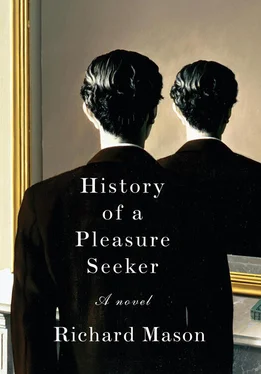Richard Mason
History of a Pleasure Seeker
Part One — THE GILDED CURVE
AMSTERDAM, 1907
The adventures of adolescence had taught Piet Barol that he was extremely attractive to most women and to many men. He was old enough to be pragmatic about this advantage, young enough to be immodest, and experienced enough to suspect that it might be decisive in this, as in other instances.
As he stepped from the Leiden train into the whirling hustle of the Central Station, several passers-by turned discreetly to look at him. He had an open face with amused blue eyes, a confident nose and thick black hair that curled around his ears. He was not much above middling height but he was muscular and well fashioned, with enormous gentle hands that made people wonder how it felt to be caressed by them.
In one of these hands on this cold February morning was an envelope too large for the pockets of his English suit. It contained a copy of his degree certificate and a letter of recommendation from a professor who owed his father a favor. As Piet crossed the traffic on the Prins Hendrikkade, he reaffirmed the decision he had made immediately on receiving Jacobina Vermeulen-Sickerts’ invitation to interview: that he would knock at the front door of the house, like an equal, and not at the servants’ entrance.
The family lived on the grandest stretch of the grandest canal in Amsterdam. Piet knew from the newspapers that Maarten Vermeulen-Sickerts dispensed bread to the slum dwellers and had been instrumental in bringing clean drinking water to the city’s poorest districts. He knew he owned the country’s most lavish hotel and a number of similar establishments across Europe. His daughters, Constance and Louisa, were familiar to Piet, too, as was their leadership of the “smart young set” and the rumor that they alarmed their mother, Jacobina. Taken together, the family had a reputation for being colorful and modern and very rich: three qualities Piet felt sure would ease the tedium of teaching a spoiled little boy.
He sauntered down the Blauwbergwal and crossed onto the Herengracht Canal. On both sides of the water, houses built for the magnates of the seventeenth century surveyed the world with the serenity that comes from surviving the upheavals of three hundred years unscathed. They were tall but slender, with none of the grandiloquence of the rich men’s houses his mother had shown him in Paris, and yet the fact that they were rich men’s houses was indisputable, and subtly advertised by the profusion of their windows.
Piet turned left, and in his head he was walking away from Leiden, from Herman Barol’s dark little house on the Pieterskerkhof and the life of the university clerk that went with it. For four years Piet had been assisting his father in sanctioning undergraduates who had omitted to pay their library fines or cheated in their exams or been caught in the company of women of ill repute. From these young men he had learned to affect the nonchalant swagger of the rich, but he had no intention of chasing them up forever.
He put a freshly laundered handkerchief over his mouth and inhaled deeply. The canal stank with a virulence for which life in the comparative simplicity of a country town had not prepared him. Within the odor’s complex depths lurked cheese rinds, rotting shoes, rats’ urine, human defecation, oil, tar, and a consignment of industrial chemicals that had leaked from a ship in the harbor. The combined effect was choking, but the people who passed him paid no attention to it. He was sure that he, too, would get used to it in time.
He continued more briskly. As the house numbers increased, so did the emphasis of the architecture’s whispered message: that people of wealth and distinction lived here. The narrower dwellings, two or three windows across, that dominated the earlier stretches of the canal grew rarer. As he crossed the Nieuwe Spiegelstraat, they all but disappeared. Soon the narrowest house was four windows wide. Which one was theirs? He looked at his watch. He was still twenty minutes early. To avoid being seen, he crossed the canal and continued his walk up the farther side.
The appearance of a house with six windows on its ground floor signaled a further elevation of status and the beginning of the Gilded Curve. He felt a pricking of panic. He had not always been a diligent student and there was little sincerity in the recommendation his professor had given him, a fact that would reveal itself to a sensitive reader. Piet was far cleverer than many who had more to show for their cleverness, but this was hardly an argument he could advance. He did speak perfect French — his mother Nina had been a Parisienne and his English and German were adequate; but his piano playing was only competent, and the advertisement had stressed Egbert Vermeulen-Sickerts’ musical genius and the desirability of a tutor who could match and extend it.
He sat down on a wrought-iron bench between two trees and collected himself. He did not have the best credentials but was wise enough to understand — even at twenty-four — that symbols on paper are not the only grounds on which people make up their minds. A tutor, after all, was more than a servant. The successful candidate would dine with the family, not wait on them, and though the Vermeulen-Sickertses had not specified this requirement, he was sure that people so à la mode would prize amusing conversation. This he was very good at making, having learned the arts of charm at his mother’s knee.
He took out Jacobina’s letter and began to sketch on the back of the envelope the austere, imposing façade of a house opposite him. When he had captured the tricky perspective of water and bricks, he felt calmer and more optimistic. He stood up and walked on; and as the canal curved again he saw the house at number 605.
The possibility that he might soon sleep in one of the rooms on its upper stories made Piet Barol shiver beneath his cashmere coat with its velvet collar, bought secondhand from a well-off student with urgent debts. The house was five windows wide and five stories high, with hundreds of panes of glass that glittered with reflections of canal and sky. The front door was on the first floor, achieved by a handsome double staircase of gray stone, and the façade of small rectangular bricks was relieved of sternness by pretty white stucco scrolls. Despite its size there was nothing showy about it, nothing over-ornamented or insecure.
Piet approved wholeheartedly.
He was crossing the bridge towards it when a man in his late twenties emerged from the servants’ entrance beneath the staircase. He was not well dressed and his suit, which had been bought in slimmer days, was too obviously “Sunday best.” He looked a little like a young man who had pursued Piet doggedly the summer before: dark and slouched, with a drooping chin and an oily nose. Piet had not let that chap have his way, and he did not intend to let this one prevail either. As his competitor made off in the direction of the station, Piet saw that he was slightly out of breath by the time he had gone a hundred yards. The spectacle cheered him.
He straightened his tie and crossed the bridge. As he prepared to mount the steps to the front door, the servants’ door opened, and a woman with a severe chin said: “Mr. Barol? We are expecting you. If you’d be so good as to step inside.”
The stink of the canals vanished at once and was replaced by the sweetness of an apple cake browning to perfection, which underscored the scents of polish and clean hair and the fragrance of a large bucket of orange roses that stood on a table by the butler’s pantry. “I am Mrs. de Leeuw, the housekeeper. Please follow me.” The lady led him into a kitchen devoted to quiet, choreographed efficiency. An enormous icebox stood in one corner, its oak door lined in white glass and held open by a handsome blond fellow of about Piet’s age to facilitate the entry of a polished jelly mold. “Careful, Hilde!” Piet’s guide spoke without tenderness. “May I take your coat, Mr. Barol? Mr. Blok will take you upstairs.”
Читать дальше












